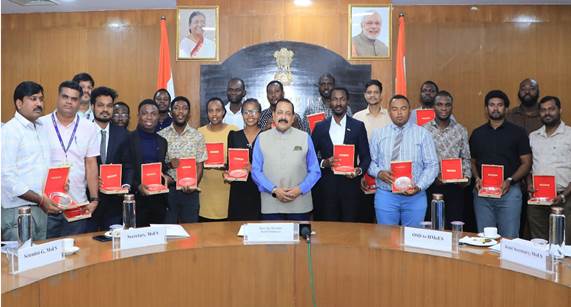New Delhi: In a move showcasing India’s dedication to sustainable ocean development, Union Minister of State (Independent Charge) for Science and Technology and Earth Sciences, Dr. Jitendra Singh, felicitated international trainees from six nations—Nigeria, Kenya, Sri Lanka, Tanzania, Ghana, and Jamaica—who completed a specialized training program in seabed exploration.
The event, organized in collaboration with the International Seabed Authority (ISA), marked the culmination of an advanced training initiative focusing on polymetallic nodules (PMN) and polymetallic sulphides (PMS) exploration. It underscored India’s leadership in environmental stewardship, international collaboration, and resource-sharing in marine science.
Addressing attendees at the Ministry of Earth Sciences in New Delhi, Dr. Jitendra Singh congratulated the trainees and described them as “ambassadors of a sustainable future.” He encouraged them to use their newly acquired expertise to advocate for marine conservation and sustainable exploration in their respective countries.
“You are not just trainees; you are part of India’s extended scientific community,” Dr. Singh said. He highlighted India’s commitment to responsible seabed mining, guided by four principles: sustainable utilization of marine resources, stringent marine environmental protection, adherence to seabed mineral regulations, and alignment with the United Nations Convention on the Law of the Sea (UNCLOS).
As a signatory to UNCLOS since 1982, India holds a prominent position in the ISA, which oversees mineral activities in international seabed areas. The country has secured two of the 31 ISA exploration contracts, focusing on PMN and PMS mining. India’s approach includes strict environmental impact assessments from exploration to post-extraction phases, reinforcing its status as a global leader in environmentally responsible marine resource development.
Dr. Singh emphasized that the training program aligns with Prime Minister Narendra Modi’s “Blue Economy” policy, which aims to leverage ocean resources for sustainable economic growth, job creation, and improved livelihoods. He reiterated that India’s approach to ocean wealth prioritizes local community benefits and marine ecosystem health, striking a balance between development and conservation.
The training modules covered advanced technologies for seabed exploration, including the use of remote-operated vehicles, deep-sea mapping, mineral analysis, and environmental impact assessments. These skills are critical for fostering a skilled workforce capable of managing marine resources sustainably.
Dr. Singh encouraged trainees to maintain connections with their Indian peers and take back India’s commitment to technological innovation and environmental responsibility. He described the program as part of India’s ongoing role as a mentor in ISA initiatives, reflecting its dedication to global capacity building in marine sciences.
Dr. Singh highlighted the importance of international collaboration, calling the trainees “global messengers of ocean conservation” with the potential to shape sustainable marine policies in their home countries. He invited feedback to further refine India’s training programs and reaffirmed the nation’s intent to deepen its partnerships with ISA and other global entities.
“India’s efforts aim to inspire other nations to adopt similar frameworks for responsible ocean exploration,” Dr. Singh concluded, expressing hope for a future where international cooperation ensures the preservation of marine ecosystems for generations to come.
The event was attended by senior officials, scientists, and dignitaries from the Ministry of Earth Sciences, who echoed the Minister’s optimism for the program’s impact and its role in promoting sustainable ocean development globally.





